We may not have the course you’re looking for. If you enquire or give us a call on +30 2111995372 and speak to our training experts, we may still be able to help with your training requirements.
Training Outcomes Within Your Budget!
We ensure quality, budget-alignment, and timely delivery by our expert instructors.
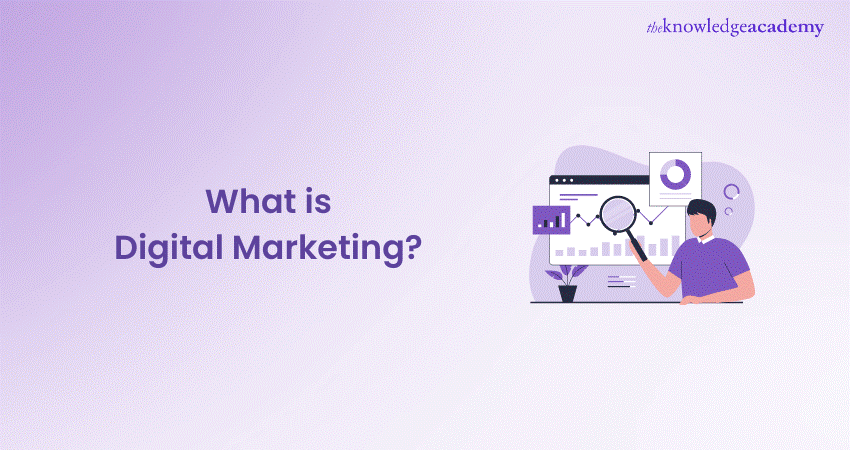
In the age where screens and clicks shape our daily interactions, Digital Marketing has emerged as the storyteller of our time, connecting brands with audiences through the internet’s boundless expanse. It's not just about selling products; it's about creating meaningful connections in an ever-evolving digital landscape. So for any aspiring marketeer, it’s vital to know What is Digital Marketing.
The online realm has unleashed a tsunami of opportunities for business owners and managed to carve out a new landscape for the business-consumer dynamic. With global Digital Advertising spending projected to reach £675.43 billion by 2027, it's fair to say that Digital Marketing is not merely a subset of marketing - It's the future of marketing! This blog deeply explores What is Digital Marketing, encompassing its importance, benefits, types and challenges. Read on and excel as a Digital Marketer.
Table of Contents
1) What is Digital Marketing?
2) Why is Digital Marketing Important?
3) How Digital Marketing Works?
4) Types of Digital Marketing
5) B2B versus B2C Digital Marketing
6) Benefits of Digital Marketing
7) How to Create a Digital Marketing Strategy?
8) Key Performance Indicators (KPIs) in Digital Marketing
9) Digital Marketing Challenges
10) Digital Marketing Examples
11) Conclusion
What is Digital Marketing?
Digital Marketing uses digital channels for marketing a product or service, which is currently the most commonly used marketing method. Mobile phones, search engines, and social media are some of the channels used in this method.
Digital Marketing examples in your daily life can be illustrated in several instances. Receiving emails from clothing stores that remind you of their latest offers is a prime example of Digital Marketing. This method helps you stay updated on the brands you follow as a consumer. As a business owner, it aids in creating a brand personality and reminding consumers about your product/service.
Why is Digital Marketing Important?
Marketing is a crucial aspect of any business, but in today's world, Digital Marketing has taken the lead due to its convenience and accessibility. With numerous digital channels available, ranging from social media platforms to text messages, businesses can easily reach out to their target audience using the tactics.
It not only boosts brand visibility but also enables to build online presence. Moreover, Digital Marketing is a cost-effective approach, as it requires minimal upfront costs. It is a boon for small businesses looking to promote their products or services on a tight budget.
How Digital Marketing Works?
Marketing involves a wide range of techniques that media companies use to promote their products and services to potential customers and enhance their market share. Achieving success in this field requires a blend of sales savvy and advertising skills.
In the past, companies primarily relied on print, television, and radio for marketing because these were the only available mediums. While these methods persist, the internet has introduced an innovative new way for companies to connect with consumers, leading to the rise of Digital Marketing.
The introduction of new Digital Marketing technologies and trends has compelled companies to transform their marketing strategies, reconsider their budgets, and significantly shape consumer behavior. Here are some key developments:
1) Initially, email marketing became a popular tool in the early days of Digital Marketing.
2) The focus then shifted to Search Engines like Netscape, allowing businesses to use tags and keywords to enhance visibility.
3) The emergence of social media platforms like Facebook and Instagram has enabled companies to track user data and target specific audiences. This illustrates the profound impact of marketing strategies on consumer behavior.
4) Today, smartphones and other portable devices make it easier for companies to market their products and services to consumers regardless of their location.
Understand the basics of online campaign planning as well by signing up for our Digital Marketing Course now!
Types of Digital Marketing
Digital Marketing has come a long way since its birth in the 90s. As the popularity of Digital Marketing grew, it had to be branched off into different types that could cater to different forms of content to produce the best results. Following are some of the major types of Digital Marketing:
Search Engine Optimisation (SEO)
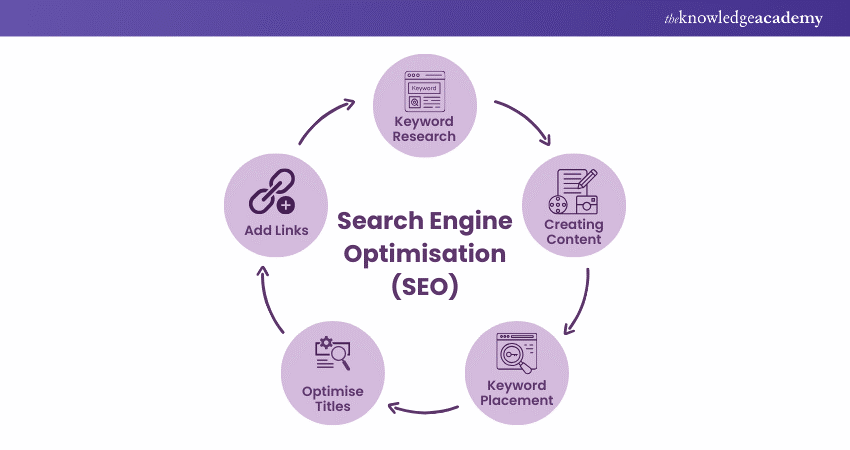
Optimising your website to achieve higher rankings in Search Engine Results Pages (SERPs) increases the organic traffic your site receives. SEO (Search Engine Optimisation) benefits various channels, including blogs, websites, and infographics. It provides a wide range of SEO strategies to attract qualified traffic to your site, tailored to different needs and preferences. These strategies include:
a) On-page SEO: This approach focuses on the content that is visible on your website's pages. By researching keywords for their search volume and intent, you can cater to readers' questions and rank higher in the SERPs for those queries.
b) Off-page SEO: This strategy involves optimising your website through activities that happen outside of your site. One key aspect is acquiring inbound links (or backlinks). The number of publishers linking to your site and the perceived “authority” of those publishers influence your ranking for the keywords you prioritize. Building relationships with other publishers, contributing guest posts, and attracting external attention can help secure the backlinks needed to elevate your site's position on relevant SERPs.
c) Technical SEO: This type of SEO deals with the backend of your website and the technical aspects of page coding. Techniques like structured data, image compression, and CSS file optimisation enhance your site's loading speed, which is a critical ranking factor for search engines like Google.
Search Engine Marketing (SEM)
When a potential lead is searching for a business or product related to yours, it’s an excellent opportunity for a promotion. Paid advertising and SEO are great strategies for promoting your business and leveraging those future leads.
Search Engine Marketing is an additional way of increasing website traffic by placing paid ads on Search Engines. The two most popular and reliable SEM services are:
a) Bing Ads
b) Google Ads
These paid ads seamlessly fit into the top of Search Engine Results Pages, giving instant visibility. This is also an example of effective native advertising. Consider the following factors while preparing the SEM strategy
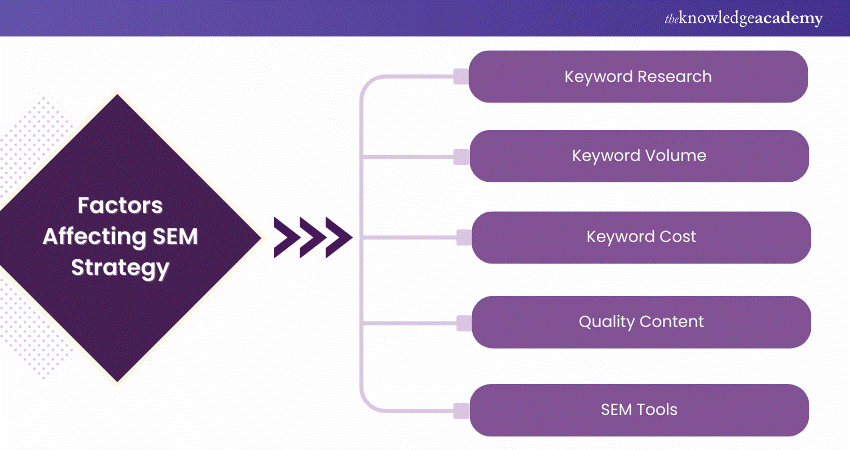
a) Keyword Research: Selecting the right keywords is the first and more important step of a Pay-Per-Click or PPC strategy. Much research goes into determining the keywords you wish to bid on.
b) Keyword Volume: Most of the time, a high volume of keywords in your content can help you bring in more competition. One of the best ways to rank better is to mix high-volume and low-competition keywords.
c) Keyword Cost: It is crucial to determine your budget according to the amount you are willing to spend for each click. The keywords with the higher competition will cost more, but it is effective as the low-cost ones won't be visible.
d) Quality Content: Once your keywords are set, the next step is to produce meaningful and engaging ads. A quality ad copy will have the required keywords in the right amount and Call-To-Actions (CTAs).
e) SEM Tools: SEM tools like HubSpot's ad tracking software can be employed to track the performance of ads. You can use its analysis to determine what worked and didn't to create a better ad strategy for the next time.
Are you struggling to increase traffic to your business website? Sign up for our Search Engine Marketing (SEM) Course now!
Content Marketing
The quality of your content is a vital component of an optimised page. This is why SEO plays a crucial role in Content Marketing, a strategy that prioritises delivering relevant content to a specific target audience. Like any marketing approach, whether it's Traditional Marketing or Digital Marketing, the aim of content marketing is to attract leads that eventually convert into customers.
However, it differs from traditional advertising by providing value upfront, providing free content such as written material, rather than merely promising potential value from a product or service. The written material include:
a) Blog posts
b) E-books
c) Video or audio transcripts
d) Whitepapers
e) Newsletters
f) Infographics
Regardless of the content you create, it’s a wise idea to follow Content Marketing best practices. This means developing content that’s grammatically correct, easy to understand, free of errors, relevant, and interesting. Your content must funnel readers to the next stage in the pipeline, whether that's a signup page or a free consultation with a sales representative.
Pay-per-click (PPC)
Pay-per-click is a Digital Marketing model where you pay a fee each time someone clicks on your online ads. Unlike traditional advertising, where a fixed amount is paid for continuous ad display, PPC charges only when users engage with the ads.
Search Engine advertising is one of the most common forms of PPC, particularly using Google Ads, as Google is the leading Search Engine. When a spot on a SERP becomes available, it triggers an immediate auction. An algorithm prioritises the ads based on several factors, including:
a) Ad quality
b) Landing page quality
c) Keyword relevance
d) Bid amount
Based on these factors, PPC ads are placed at the top of SERPs every time someone searches for a relevant query.
Each PPC campaign is designed with specific target actions, known as conversions, that viewers are encouraged to complete after clicking an ad. Conversions can be transactional, like making a purchase, or non-transactional, like calling your office or signing up for a newsletter. You can track these conversions through your chosen Digital Marketing channels to evaluate your campaign's effectiveness.
Social Media Marketing
Social Media Marketing is a versatile tool that can be used to drive traffic, enhance brand awareness, and engage in online discussions. It provides a platform to showcase your brand, products, services, and culture to a vast audience. With billions of active users on social media platforms, investing in social media marketing can yield significant benefits for your business.
The most widely used digital platforms for Social Media Marketing are:
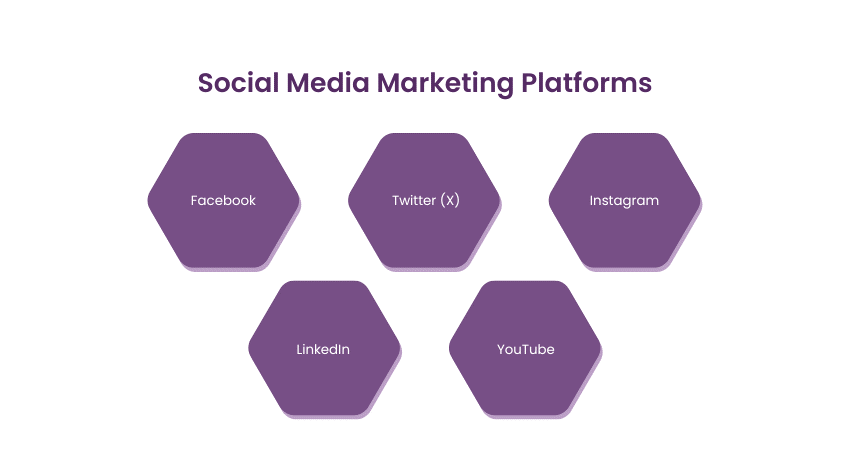
a) Facebook
b) Twitter
c) Instagram
d) LinkedIn
e) YouTube.
Eventually, which social media platforms you use for your business depends on your audience and goals. Consider these examples:
a) If you are seeking new leads for your FinTech startup, targeting your audience on LinkedIn is ideal way to go, since industry professionals are active on the platform.
b) If you run a B2C focused on younger consumers, running Social Media ads on Instagram may be better for your brand.
Social Media Marketing provides built-in engagement metrics, which help you understand how well you are reaching your audience. You get to decide which interactions are the most relevant, whether that means the number of shares, comments, or total clicks to your website.
Many brands use Social Media Marketing to initiate conversations with their audiences rather than focusing solely on immediate sales. This approach is prevalent among brands targeting older audiences or offering products and services not typically purchased impulsively.
Following best practices to create an effective social media marketing strategy is crucial. Here are a few of the necessary social media marketing best practices:
a) Craft engaging and high-quality content
b) Reply to questions and comments in a professional manner
c) Develop a Social Media posting schedule
d) Post at the right time
e) Hire Social Media Managers to catalyse your marketing efforts
f) Know your audience and which Social Media channels they frequent on a regular basis
Looking to enhance your business presence in Social Media? Sign up for our Social Media Marketing Course now!
Affiliate Marketing
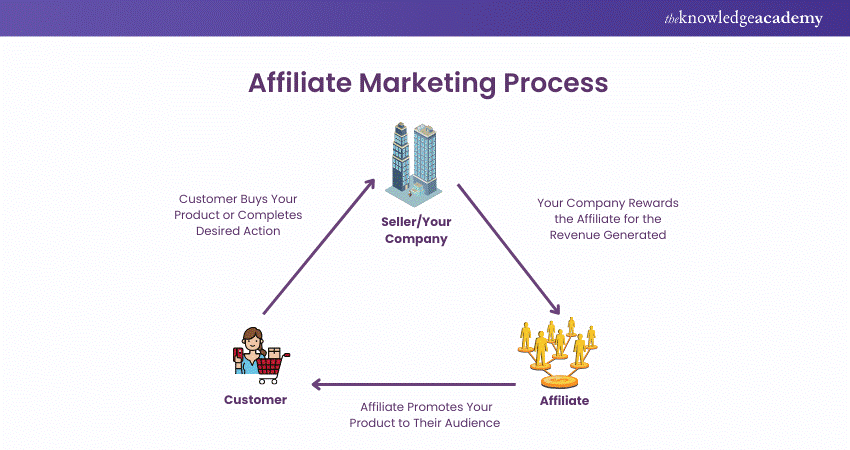
Affiliate marketing is a Digital Marketing method that entails a business or affiliate receiving a commission for promoting another brand’s products or services. The three parties involved in this advertising strategy are the seller, the affiliate, and the consumer.
There are three types of affiliate marketing based on the connection between the seller and the affiliate – unattached, related, and involved. Let’s understand this marketing method better by differentiating between the three types:
a) Unattached: Unattached affiliate marketing is a business model where the seller and affiliate are not connected. The affiliate won’t have any similarities with the product or service of the seller. This means that they lack a comprehensive ad strategy for the seller and are most likely to run PPC marketing campaigns.
b) Related: The related type of affiliate marketing refers to a partial connection between the seller and the affiliate. It is used to target consumers that do not use the seller’s products or services but are related to the niche audience.
c) Involved: Involved affiliate marketing occurs between parties that are tightly related to each other’s product or service. Since the affiliate will be well-informed about the product or service, they can create engagement strategies to help the ad fare well.
Broaden your business prospects with our Affiliate Marketing Course - Register now!
Email Marketing
Email marketing is a Digital Marketing tactic that sends newsletters, brand offers, and more via mail to a target audience. It follows a subtle approach to educating the audience about the brand and what it can offer. It helps in lead generation and cultivating long-lasting relationships with customers.
A single email can make a lasting impact. If a user gets intrigued by an ad and signs up for the brand, they have already made it to the client database, receiving all related emails about updates, offers, et. It is an essential branch of Digital Marketing.
E-commerce brands like Nykaa is an excellent example of a brand that follows email marketing. Every new product release or offer on their products is communicated attractively via emails. Nykaa designs its emails in a vibrant way which promotes its brand personality and retains customers.
Video Marketing
Digital Marketing can be implemented in various ways. Video marketing refers to the use of content in video format for promoting business. It is a highly effective marketing strategy because people always respond to visual cues over text. Brands can grow by creating videos and releasing them on the right channel.
Instagram is one of the more useful platforms to grow on, especially for small-business owners. Posting engaging reels about your product or service helps create brand awareness.
For instance, newly opened bakeries establish their presence on Instagram using videos showcasing their process of baking cakes, cookies, etc. Even high-end brands like Calvin Klein release videos of their latest collection with globally renowned celebrities that fit their brand personality. These strategies help attract new customers and retain the existing ones.
Expand your customer base in the realm of online videos with our Video Marketing Course – Sign up now!
Marketing Automation
Marketing automation utilises software to streamline and enhance Digital Marketing Campaigns, which boosts the efficiency and relevance of your advertising efforts. This technology enables you to concentrate on crafting the strategic aspects of your Digital Marketing initiatives, rather than getting bogged down by tedious, time-consuming tasks.
Although marketing automation might seem like an optional tool, it can greatly increase the engagement between your business and your audience. Marketing automation helps businesses meet the growing demand for personalisation. It allows brands to:
a) Collect and analyse consumer data
b) Create targeted marketing campaigns
c) Deliver Digital Marketing messages at the optimal times to the right audiences
Many marketing automation tools assess a prospect's engagement with a specific message to determine the best timing and method for follow-up. This level of real-time customisation allows you to craft an individualised marketing strategy for each customer without having to invest in additional time.
Mobile Marketing
Mobile Marketing is a Digital Marketing strategy that enables you to engage with the target audience on their mobile devices, such as tablets or smartphones. This can be via SMS and MMS messages, Social Media notifications, Mobile App alerts, and more.
It’s crucial to ensure that all content is optimised for mobile devices. Mobile seems to be the dominant channel as far as online shopping in the UK is concerned. From pre-purchase browsing to conversions, mobile phones cornered online traffic to retail websites, accounting for nearly 80 percent (Statista) of online visits and being used for over 70 per cent of orders.
B2B versus B2C Digital Marketing
Digital Marketing strategies are impactful for both B2B (business-to-business) and B2C (business-to-consumer) companies, but best practices can vary significantly. Here's a closer look at the differences in how Digital Marketing is employed in B2B and B2C strategies.
1) B2B clients often have longer decision-making processes, resulting in longer sales funnels. Relationship-building strategies are more effective for these clients, whereas B2C customers respond better to direct messaging and short-term offers.
2) B2B transactions are typically driven by logic and evidence, which skilled B2B Digital Marketers emphasise. In contrast, B2C content is more emotionally-driven, focusing on creating a positive feeling about a purchase.
3) B2B decisions often involve multiple stakeholders, so marketing materials that are shareable and downloadable are most effective. B2C customers, however, prefer one-on-one connections with a brand.
Of course, there are exceptions to every rule. For example, a B2C company with a high-ticket item like a computer or a car might offer more serious and informative content. Ultimately, your Digital Marketing strategy should be tailored to your specific customer base, whether you're in B2B or B2C.
Benefits of Digital Marketing
The significance of using Digital Marketing to boost your business is recognised globally. Thus, it is implemented in the marketing strategy of almost every product or service across industries. Following are some other benefits of using it:
a) Cost-effective: Unlike other marketing methods, Digital Marketing lets you choose the channel you wish to market on. Since it's possible to determine which medium works best for your company, you can invest in that channel alone, thereby saving time and money. For instance, you can pick the best channel if you run a clothing brand and are trying to get the word out about a new collection.
Social Media will be the most effective digital channel if the target audience is the youth. You can determine the effectiveness of channels as Digital Marketing helps track their daily performance. It is easier to spot the performing poorly channels and, thus, use the ones that bring the most traffic. All this proves that it can be measured, and one of its primary examples is website traffic.
b) Website Traffic: Digital Marketing has a clear upper hand compared to offline marketing. While offline marketing results are difficult to devise, Digital Marketing or online marketing has access to the number of users that have viewed your product/service. It can track the number of users visiting your website using digital analytics software. When you have information regarding the exact parts of your brand that users are interested in, you can prioritise your marketing goals. This includes choosing the channel with the most traffic or deciding which website page requires the most attention regarding content and design.
c) Levels the Playing Field: Digital Marketing's primary feature is that it is a very approachable method. Anybody can put up their brand on the internet and increase its awareness. This is an instrumental quality that helps small or comparatively unpopular brands to market themselves. It allows them to level the playing field and compete against established companies that invest a lot in marketing methods. Young companies would only have a small sum initially to use for marketing purposes. To increase engagement, they would have to resort to producing quality content that gets recognised by search engines and ranks high.
c) Helps Establish a Recurring Customer Base: The objective of marketing in the first place is to attract potential customers and retain existing ones. Digital Marketing is the perfect companion for building a memorable brand personality. Once your brand personality is established, the next step is releasing engaging and helpful content that reflects the relevance of your brand and keeps pushing its necessity in your customers’ lives.
Consistent exposure to media regarding your brand can invoke a recurring need to use your product/service.
How to Create a Digital Marketing Strategy?
Starting with Digital Marketing for small businesses and beginner marketers can be a challenging task that requires considerable time and effort. With a well-planned and effectively executed the strategy, it is possible to achieve a significant increase in brand awareness, customer engagement, and sales. To get started, consider the following steps as your foundation for building a successful Digital Marketing campaign.
Set SMART Goals
As you plan your Marketing strategy, it is important to specify goals that are specific, measurable, achievable relevant, and time-bound. These SMART goals provide a roadmap for your Marketing efforts and help you stay focused on the things that will drive your business forward. By prioritising the goals that will have the most significant impact on your system and avoiding those that could lead to stagnation, you can ensure that your Marketing efforts are always moving in the right direction.
Identify Your Audience
It is important to determine your target audience beforehand to ensure the success of your Marketing campaign. Your target audience is the specific group of individuals that you aim to reach through your campaign. This group can be determined based on several factors, such as age, gender, demographics, and purchasing behaviour. An understanding of your audience can help you strategically select appropriate Digital Marketing channels and craft personalised messaging that will resonate with your audience and boost engagement.
Create a Budget
Have you ever found yourself spending money on Digital Marketing channels that do not provide the desired results? That's where a budget comes in handy. By drafting a budget, you can ensure that you are spending your money effectively towards your goals. To create a budget, consider your SMART objectives and the specific digital channel you plan to use. This will help you to distribute your resources in the most efficient way possible and make the most out of your Digital Marketing efforts.
Select Your Digital Marketing Channels
To promote your brand online, there are various Digital Marketing channels at your disposal. From content marketing to Pay-Per-Click advertising and beyond, the choice of channels you opt for largely depends on your specific objectives, target audience, and financial resources. By carefully selecting the most suitable channels, you can increase brand visibility and ultimately drive conversions.
Refine Your Marketing Efforts
After your campaign has ended, it is crucial to analyse the data to determine what worked well and where improvements can be made. This analysis will help you create even more effective campaigns in the future.
Thanks to digital technologies and software, you can easily access this data through an intuitive dashboard that presents the information clearly and concisely. By leveraging this data, you can optimise your Marketing strategies.
Key Performance Indicators (KPIs) in Digital Marketing
Key Performance Indicators play a vital role in evaluating Digital Marketing strategies' effectiveness. Let’s explore some common KPIs that marketers use to measure success:
1) Click-through Rate (CTR): CTR measures the effectiveness of online advertising by calculating the percentage of people who clicked on a specific ad out of the total number of people who saw it. A higher CTR indicates better engagement with your content.
2) Conversion Rate: Going beyond CTR, the conversion rate compares the percentage of people who took a desired action (such as making a purchase) to the total audience reached by an ad or promotion. It reflects how well your marketing efforts translate into tangible results.
3) Social Media Traffic: This KPI tracks interactions on your company’s social media profiles, including likes, follows, views, shares, and other measurable actions. It helps gauge audience engagement and brand affinity.
4) Website Traffic: Measuring how many people visit your website during a specific period provides insights into how well your marketing efforts are faring. It helps assess whether your strategies successfully drive consumers to your site.
Digital Marketing Challenges
Digital Marketing presents unique challenges, including keeping up with the rapid expansion of digital channels and understanding user interactions. Let’s explore some of the challenges faced by Digital Marketers:
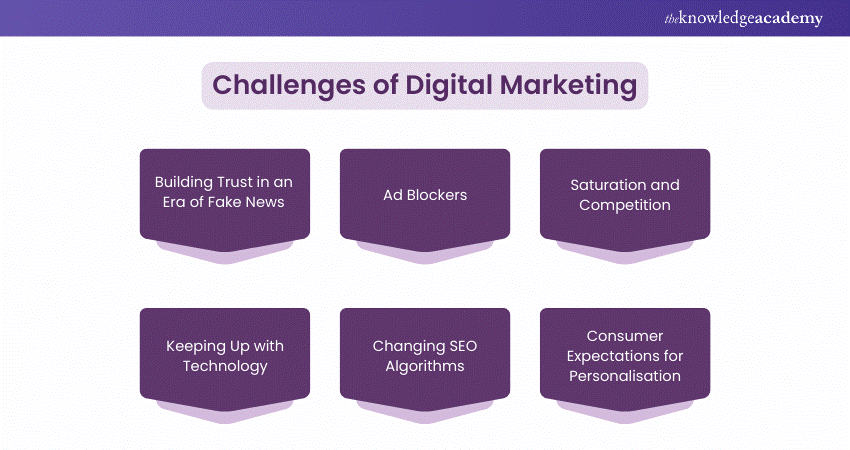
a) Building Trust in an Era of Fake News: Establishing trust with your audience is now more challenging and critical than ever, especially in a landscape where misinformation and "fake news" are rampant. Consumers are growing increasingly sceptical of the information they encounter online, making it essential for brands to build and sustain credibility.
b) Ad Blockers: Ad blockers will directly affect the revenue of websites that rely on advertising by preventing ads from being served to a portion of their audience. This makes it challenging for marketers to reach their target demographics and measure campaign effectiveness accurately.
c) Saturation and Competition: Saturation occurs when there is so much content and advertising online that it becomes difficult for any single message to stand out. As digital platforms have become central to marketing strategies, the online space is now crowded with advertisements, content, and promotions from countless sources.
d) Keeping Up with Technology: Keeping up with technology in the new Digital Marketing era is akin to riding a fast-moving train; continuously adapting and learning is essential to ensure you don’t get left behind. As digital technology rapidly evolves, it introduces new tools, platforms, and strategies that can significantly impact how businesses reach and engage with target audiences.
e) Changing SEO Algorithms: The dynamism in these algorithms stems from the search engines’ commitment to delivering the best user experience by showcasing the most pertinent and high-quality content. These changes can make life tricky for marketers and website owners. Staying informed and understanding the impact of SEO strategies can be daunting. What might have been effective yesterday may not hold today.
f) Consumer Expectations for Personalisation: In the new Digital Marketing era, consumer expectations for personalisation have significantly evolved. Today’s consumers desire and expect content, offers, and experiences tailored specifically to their preferences, interests, and behaviour. Marketers face several challenges in terms of personalisation.
Data Management poses a significant hurdle, requiring efficient collection, analysis, and responsible utilisation of large volumes of data. Striking the right balance between Data Privacy and personalisation is crucial to maintaining consumer trust.
Digital Marketing Examples
Now that you are acquainted with the most vital aspects of Digital Marketing, it’s time to get inspired. We explore three brilliant examples of Digital Marketing below:
Samsonite - Search Engine Marketing
Search engine marketing is a prime example of Digital Marketing. In this approach, brands bid on keywords and display ads for their products in Search Engine Results Pages (SERPs) when users search for related terms.
The image below illustrates an example from Samsonite. A search for "luggage," followed by a filter for "Samsonite Luggage," brings up various options from the brand, highlighting products through strategically placed ads at the top of the search results.
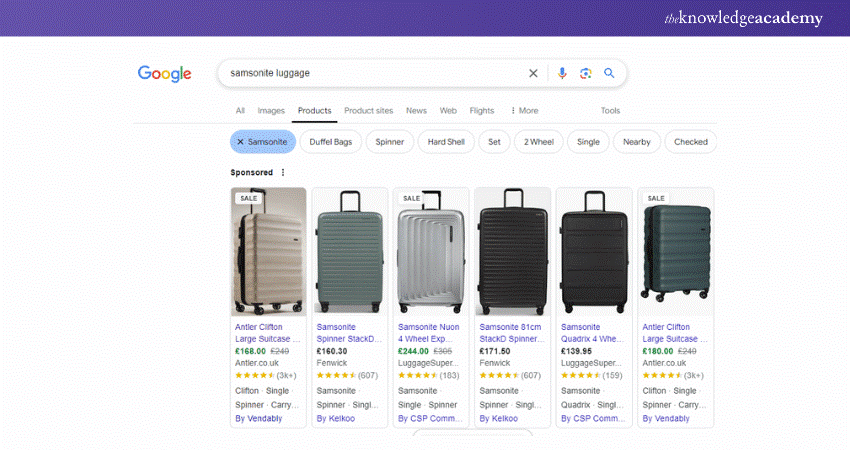
Topicals - Email Marketing
Topicals, a skincare company, incorporates Email Marketing into its Digital Marketing strategy. The image below shows a marketing email promoting a ‘subscribe and save’ offer, where customers receive a 20% discount on refills when they opt to subscribe.

Lego's Rebuild the World Campaign
This is an excellent example for What is Digital Marketing because it spotlights important aspect of the brand. In this campaign, Lego takes a stance on critical global issues to connect with the audience. Nowadays, it's becoming increasingly vital for companies to discuss international problems and show alignment with their customers in that way. This campaign aims to help share the brand's story and messaging.

Conclusion
Digital Marketing encompasses a wide range of strategies and tools to connect with audiences in the digital landscape. From SEO to Email Marketing, each component plays a crucial role in engaging customers and driving business growth. It’s essential for any marketer in this day and age to understand What is Digital Marketing. We hope this blog broaden the scope of your business in today’s internet-driven world.
Looking for guidance in creating visually appealing product content for E-commerce excellence? Sign up for our Product Content for E-Commerce Training now!
Frequently Asked Questions

Digital Marketers need strong writing and social media skills and a good understanding of Data Analytics. A bachelor's degree is required for most Digital Marketing positions. Taking Digital Marketing Courses or Training can be extremely helpful.

Strong communication skills are essential for a marketer to be successful in telling a company or product's story to potential customers. Data Analytics skills are vital for understanding how well a marketing campaign performs and where it might be improved. Finally, social media skills are another must.

The Knowledge Academy takes global learning to new heights, offering over 30,000 online courses across 490+ locations in 220 countries. This expansive reach ensures accessibility and convenience for learners worldwide.
Alongside our diverse Online Course Catalogue, encompassing 17 major categories, we go the extra mile by providing a plethora of free educational Online Resources like News updates, Blogs, videos, webinars, and interview questions. Tailoring learning experiences further, professionals can maximise value with customisable Course Bundles of TKA.

The Knowledge Academy’s Knowledge Pass, a prepaid voucher, adds another layer of flexibility, allowing course bookings over a 12-month period. Join us on a journey where education knows no bounds.

The Knowledge Academy offers various Digital Marketing Courses, including the Social Media Marketing Course and the Copywriting Course. These courses cater to different skill levels, providing comprehensive insights into Digital Marketing Campaign.
Our Digital Marketing Blogs cover a range of topics related to Digital Marketing, offering valuable resources, best practices, and industry insights. Whether you are a beginner or looking to advance your Digital Marketing skills, The Knowledge Academy's diverse courses and informative blogs have got you covered.
Upcoming Digital Marketing Resources Batches & Dates
Date
 Digital Marketing Course
Digital Marketing Course
Fri 24th Jan 2025
Fri 28th Mar 2025
Fri 23rd May 2025
Fri 25th Jul 2025
Fri 26th Sep 2025
Fri 28th Nov 2025







 Top Rated Course
Top Rated Course



 If you wish to make any changes to your course, please
If you wish to make any changes to your course, please


